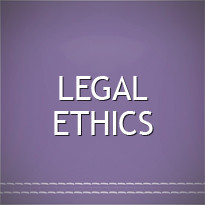G.R. No. L-961 – 84 Phil. 569 – Legal Ethics – Existence of Attorney-Client Relationship – Conflict of Interest – A lawyer cannot represent opposing claims
In April 1945, Blandina Hilado filed a complaint to have some deeds of sale annulled against Selim Assad. Attorney Delgado Dizon represented Hilado. Assad was represented by a certain Atty. Ohnick.
In January 1946, Atty. Vicente Francisco replaced Atty. Ohnick as counsel for Assad and he then after entered his appearance in court.
In May 1946 or four months later, Atty. Dizon filed a motion to have Atty. Francisco be disqualified because Atty. Dizon found out that in June 1945, Hilado approached Atty. Francisco to ask for additional legal opinion regarding her case and for which Atty. Francisco sent Hilado a legal opinion letter.
Atty. Francisco opposed the motion for his disqualification. In his opposition, he said that no material information was relayed to him by Hilado; that in fact, upon hearing Hilado’s story, Atty. Francisco advised her that her case will not win in court; but that later, Hilado returned with a copy of the Complaint prepared by Atty. Dizon; that however, when Hilado returned, Atty. Francisco was not around but an associate in his firm was there (a certain Atty. Federico Agrava); that Atty. Agrava attended to Hilado; that after Hilado left, leaving behind the legal documents, Atty. Agrava then prepared a legal opinion letter where it was stated that Hilado has no cause of action to file suit; that Atty. Agrava had Atty. Francisco sign the letter; that Atty. Francisco did not read the letter as Atty. Agrava said that it was merely a letter explaining why the firm cannot take on Hilado’s case.
Atty. Francisco also pointed out that he was not paid for his advice; that no confidential information was relayed because all Hilado brought was a copy of the Complaint which was already filed in court; and that, if any, Hilado already waived her right to disqualify Atty. Francisco because he was already representing Assad in court for four months in the said case.
Judge Jose Gutierrez David ruled in favor of Atty. Francisco.
ISSUE: Whether or not Atty. Francisco should be disqualified in the said civil case.
HELD: Yes. There already existed an attorney-client relationship between Hilado and Atty. Francisco. Hence, Atty. Francisco cannot act as counsel against Hilado without the latter’s consent.
As ruled by the Supreme Court, to constitute an attorney-client relationship, it is not necessary that any retainer should have been paid, promised, or charged for; neither is it material that the attorney consulted did not afterward undertake the case about which the consultation was had. If a person, in respect to his business affairs or troubles of any kind, consults with his attorney in his professional capacity with the view to obtaining professional advice or assistance, and the attorney voluntarily permits or acquiesces in such consultation, then the professional employment must be regarded as established.
Further:
An attorney is employed-that is, he is engaged in his professional capacity as a lawyer or counselor-when he is listening to his client’s preliminary statement of his case, or when he is giving advice thereon, just as truly as when he is drawing his client’s pleadings, or advocating his client’s cause in open court.
Anent the issue of what information was relayed by Hilado to Atty. Francisco: It does not matter if the information relayed is confidential or not. So long as the attorney-client relationship is established, the lawyer is proscribed from taking other representations against the client.
Anent the issue that the legal opinion was not actually written by Atty. Francisco but was only signed by him: It still binds him because Atty. Agrava, assuming that he was the real author, was part of the same law firm. An information obtained from a client by a member or assistant of a law firm is information imparted to the firm, his associates or his employers.
Anent the issue of the fact that it took Hilado four months from the time Atty. Francisco filed his entry of appearance to file a disqualification: It does not matter. The length of time is not a waiver of her right. The right of a client to have a lawyer be disqualified, based on previous atty-client relationship, as counsel against her does not prescribe. Professional confidence once reposed can never be divested by expiration of professional employment.


